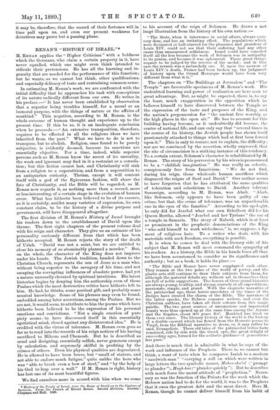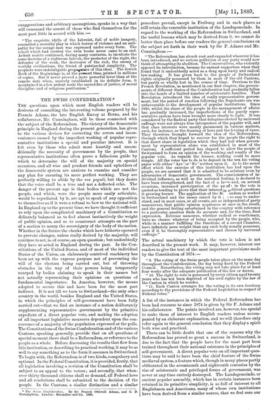RENAN'S "HISTORY OF ISRAEL."*
M. RERAN applies the "Higher Criticism" with a boldness which the Germans, who claim a certain property in it, have never equalled, which one might even think intended to ridicule their pretensions. He has all the learning and in- genuity that are needed for the performance of this function ; but he wants, as we cannot but think, other qualifications, and especially delicacy of taste and restraining common-sense.
In estimating M. Renan's work, we are confronted with the initial difficulty that he approaches his task with conceptions of its natu're radically different from our own. He writes in his preface :—" It has never been established by observation that a superior being troubles himself, for a moral or an immoral purpose, with the things of nature or the affairs of mankind." This negation, according to M. Renan, is the whole outcome of human thought and experience up to the present time. If this be so, it is an inadequate conclusion when he proceeds :—" An extensive transposition, therefore, requires to be effected in all the religious ideas we have inherited from the past." What we have to do is not to transpose, but to abolish. Religion, once found to be purely subjective, is evidently doomed, because its sanctions are essentially objective. For a time, indeed, while superior persons such as M. Renan know the secret of its unreality, the weak and ignorant may find in it a restraint or a consola- tion; but this fiction cannot last, and Christianity will sink from a religion to a superstition, and from a superstition to an antiquarian curiosity. Theism, except it will content itself with a god of the Epicurean fashion, will share the fate of Christianity, and the Bible will be regarded, as M. Renan now regards it, as nothing more than a record, more or less interesting, of a certain stage in the evolution of human error. What has hitherto been believed to be of its essence, as it is certainly, amidst many varieties of expression, its own constant claim, to be the history of a divine purpose and government, will have disappeared altogether.
The first division of M. Renan's History of Israel brought his readers down to the establishment of David upon the throne. The first eight chapters of the present volume deal with his reign and character. They give us an estimate of his personality curiously different from that which has been hitherto accepted. M. Renan rejects the story of the death of Uriah. "David was not a saint, but we are entitled to clear his memory of so abominably planned a murder." But, on the whole, the character of the King does not improve under his hands. The Jewish tradition, handed down to the Christian Church, represents the son of Jesse as a man who, without being superior to the savagery of his time, and not escaping the corrupting influences of absolute power, had yet a nature unusually elevated by spiritual intuitions. His latest historian begins by denying him the authorship even of those Psalms which the most destructive critics have hitherto left to him. He had, he thinks, some poetical gift, and probably some musical knowledge. Some of his phrases may even be found, embedded among later accretions, among the Psalms. But we are not, it would seem, to attribute to him the poems which have hitherto been believed to be the expression of his personal emotions and convictions. "Not a single emotion of pure piety seems. to have discovered itself in this essentially egotistical mind, closed against any disinterested idea." He is credited with the virtue of tolerance. M. Renan even goes so far as to read into the records of his reign notices of his having sacrificed to Milcom and Chemosh. But he is described as cruel and designing, essentially selfish, never generous except by calculation, and supremely skilful in profiting by the crimes of others. Even his physical qualities are depreciated. He is allowed to have been brave, but "small of stature, and not able to endure much fatigue," quite unlike the hero who was "able to break even a bow of steel," and "by the help of his God to leap over a wall." If M. Renan is right, history has lost one of its most beautiful figures.
We find ourselves more in accord with him when we come
• History of the People of Israel, from the Reign of David up to the Capture of Samaria. From the French of Ernest Renan. Second Division. London ; Chapman and Hall. 1889.
to his account of the reign of Solomon. He draws a not inapt illustration from the history of his own nation :—
"The State, when it intervenes in social affairs, always costs very dear, and has an irritating effect. The populations which were decimated or half-starved for the pleasures and grandeur of Louis XIV. could not see that their suffering had any other cause than unmeasured selfishness. Israel could have consoled itself all the less because the work of Solomon was in antipathy to its genius, and because it was ephemeral. These great things require to be judged by the reverse of tho medal ; and in this case the reverse was a melancholy one. If, upon the morrow of Louis XIV.'s death, France had been broken up, the judgment of history upon the Grand Monarque would have been very different from what it is."
The chapters on "The Buildings at Jerusalem" and "The Temple" are favourable specimens of M. Renan's work. His undoubted learning and power of realisation are here seen to great advantage. But, as might be expected, there is, to say the least, much exaggeration in the opposition which he believes himself to have discovered between the Temple as
the expression of the taste and purposes of the King, and. the nation's prepossession for "the ancient free worship at the high places in the open air." He has to account for this building having become, as it undoubtedly did become, the centre of national life, and can only say that "several times in the course of its history, the Jewish people has shown itself passionately attached to things which had at first been forced, upon it." This is only th restate, not to explain, the difficulty; nor are we convinced by the assertion, wholly unproved, that the rite of circumcision is a striking instance of this tendency. To a certain extent, Solomon's character is rehabilitated by M. Renan. The story of his perversion by his wives is pronounced. to be a "childish imagination." He was really an eclectic, conspicuously free from fanaticism. "We do not find, during his reign, those wholesale human sacrifices which disgraced the reigns of Saul and David." Our author seems. to have forgotten that he has attributed the same qualities of toleration and eclecticism to David. Another tolerant Sovereign, according to M. Renan, was Ahab. "Ahab, like Solomon, only appears to have been guilty of one crime, but that, the crime of tolerance, was an unpardonable one in the eyes of the fanatics." According to his apologist, he only did for Jezebel what our own Ethelbert did for his Queen Bertha, allowed "Jezebel and her Tyrians " the use of a temple in Samaria. The story of Naboth, which is at least as prominent in the prophetic denunciations of the King "who sold himself to work wickedness," is, we suppose, a fig- ment of religious hate. To a writer who deals with hia materials with such freedom, everything is possible.
It is when he comes to deal with the literary aide of his
subject that M. Renan will most command the sympathy of his readers. As a history, the Bible in his hands loses all that we have been accustomed to consider as its significance and. authority; but as a book, it holds its place :— " The Bible and Homer have never supplanted each other. They remain at the two poles of the world of poetry, and the plastic arts still continue to draw their subjects from them, for although the material details are without art in themselves they are full of noble suggestions. The heroes of these grand histories are always young, healthy, and strong, scarcely at all superstitious. passionate, simple, and grand. With the exquisite narrative of the patriarchal age, these heroic anecdotes of the times of the Judges have created the charm of the Bible. The narrators of the latter epochs, the Hebrew romance writers, and even the Christian authors, have taken all their colours from this magic palette. The two great sources of unconscious and impersonal beauty were thus opened up at the same time among the Aryans and the Semites, about 900 years B.C. Mankind has lived on them ever since. The literary history of the world is the history of a double current which has flowed from the Homeric poems to Virgil, from the Biblical narrative to Jesus, or, it may rather be said, Evangelists. These old tales of the patriarchal tribes have remained, side by side with the Greek epic, the great delight of succeeding ages, formed for the wsthetic guidance of generations less pure."
And there is much that is admirable in what he says of the
work and influence of the Prophets. There is, we cannot but think, a want of taste when he compares Isaiah to a modern "sandwich-man" "carrying a roll on which were written in large letters the two symbolic names, Maher-shalal (" prompt to plunder "), Hagh-baz (" plunder quickly "). But he describes with much force the moral attitude of " prophetism." Neces-
sary as was the function of the Priests for the work which the Hebrew nation had to do for the world, it was to the Prophets that it owes the greatest debt and the most direct. Here M.
Renan, though he cannot deliver himself from his habit of exaggerations and arbitrary assumptions, speaks in a way that will command the assent of those who find themselves for the most part little in accord with him :—
"The exquisite idylls of the lahveist, full of noble imagery, resembled a morality play in which horror of violence and an anti- pathy for the savage man was expressed under every form. The school which had created the twin books never came to an end. Ardent zealots continued, during many centuries, to inculcate the same doctrine of a righteous lahveh, the protector of the right, the defender of the weak, the destroyer of the rich, the enemy of worldly civilisations, the friend of patriarchal simplicity. The prophets were indefatigable propagators of this ideal. The Jewish Book of the Beginnings is, at the present time, printed in millions of copies. But it never proved a more powerful lever than at the remote date when, scarcely established in its definite form, it maintained in a few ardent souls the sacred fire of justice, of moral discipline and of religious puritanism."







































 Previous page
Previous page